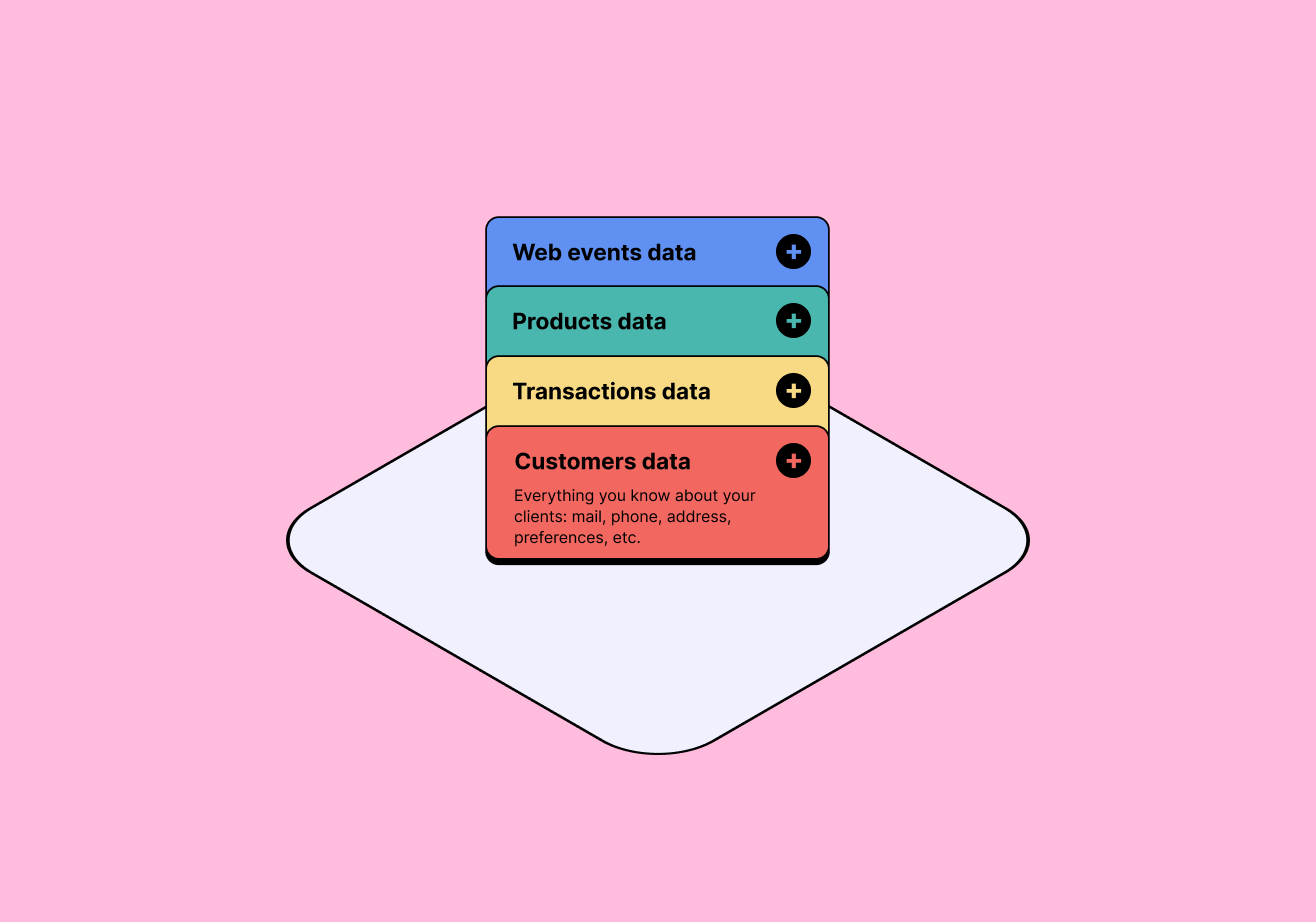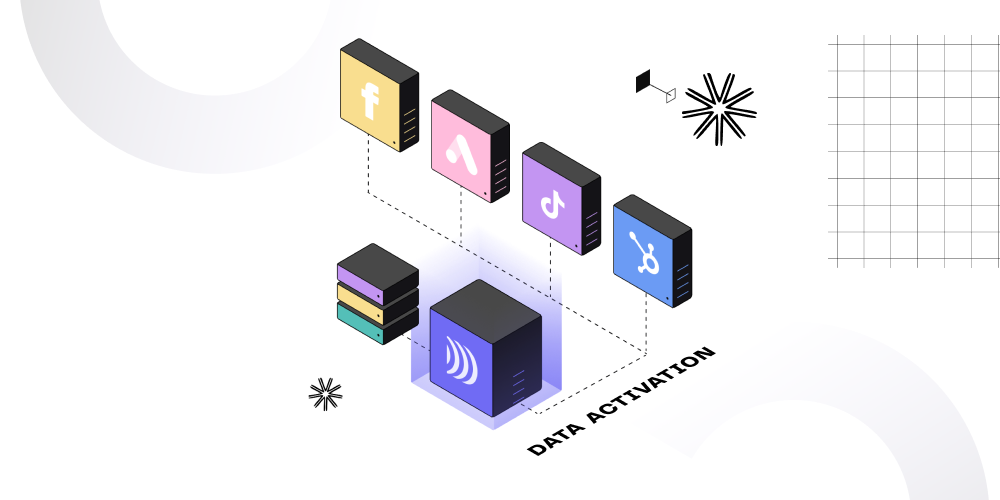
How AI can optimise your business operations?
5min • Last updated on Dec 8, 2025

Nils Hasselmark
Product Manager
In the early 2000s, the internet began disrupting traditional sales channels, introducing what would become the new standard for most industries: e-commerce.
Ten years later, companies started collecting large amounts of customer data. Initially, this data collection helped better understand customer behaviours. More recently, with the rise of cloud computing and data warehousing, it has enabled businesses to tailor their marketing approaches to individual customers thanks to data activation.
The recent release of ChatGPT by OpenAI in 2022 marks the start of a third chapter in this era of profound digital transformation. After years of promising research, AI technologies are finally making their way into the business world, driven by advances in GPU capabilities.
In this article, we explore how to embrace these new technologies to boost business operations, especially marketing.
1️⃣ Enhance customer support
For many B2C companies, customer support represents one of the most substantial overhead costs, particularly in maintaining call centers. The introduction of AI chatbots is starting to revolutionise this area by providing efficient and effective customer support at a fraction of the cost.
AI chatbots can now handle a wide range of customer inquiries, from answering frequently asked questions to assisting with troubleshooting issues. They are available 24/7, providing immediate responses and reducing wait times for customers. This not only enhances the customer experience but also decreases the need for large teams of human support agents.
Tools such as Reverse ETL also help to obtain 100% of customer information in support tools, enabling better prioritisation of tickets.
2️⃣ Automate repetitive tasks
Machine learning technologies enable the automation of processes that, while not strictly repetitive, previously required human intervention. This can lead to drastic reductions in overhead costs.
By automating tasks like sending emails, managing advertising campaigns, and analysing data, marketing teams can focus on higher-value tasks. For example, most data activation solutions enable large-scale synchronisation of highly targeted audiences, enhancing campaign effectiveness and reducing operational costs through the use of fresh data.
Many tasks performed by different teams (data, marketing, support, etc.) can be automated using artificial intelligence.
3️⃣ Optimise marketing spendings
Generative AI is transforming the creation of marketing content. It can create text, images, infographics and even videos in a matter of seconds. Tools such as Dall-E, Leonardo and Midjourney produce high-quality visuals based on a simple prompt, at low cost.
An AI presentation generator for free helps you boost productivity while reducing time and content creation costs. By integrating AI agents into marketing operations, brands can personalise their messaging while improving the efficiency of their advertising campaigns.
AI also helps to optimise advertising spend in real time, maximising its impact on return on investment.
AI-powered advertising platforms can adjust bids in real time based on ad performance. This maximises the impact of ads while reducing costs. For example, Google Ads uses AI to adjust bids automatically, ensuring that the advertising budget is spent optimally.
Of course, you can't directly influence the way advertising platforms' algorithms work. But your role is to provide them with as much qualified data as possible.
4️⃣ Remove technical barriers to leverage data
Exploiting customer data throughout the whole customer journey is key to:
Understand who are the most qualified leads (lead scoring) and define sales strategies based on this scoring
Personalise product recommendations to encourage cross-sell and up-sell opportunities
Detect people at risk of churn and send them offers at the right time
Re-activate passive customers
Data was often locked away in an IT domain, and marketers were unable to use it for their strategies.
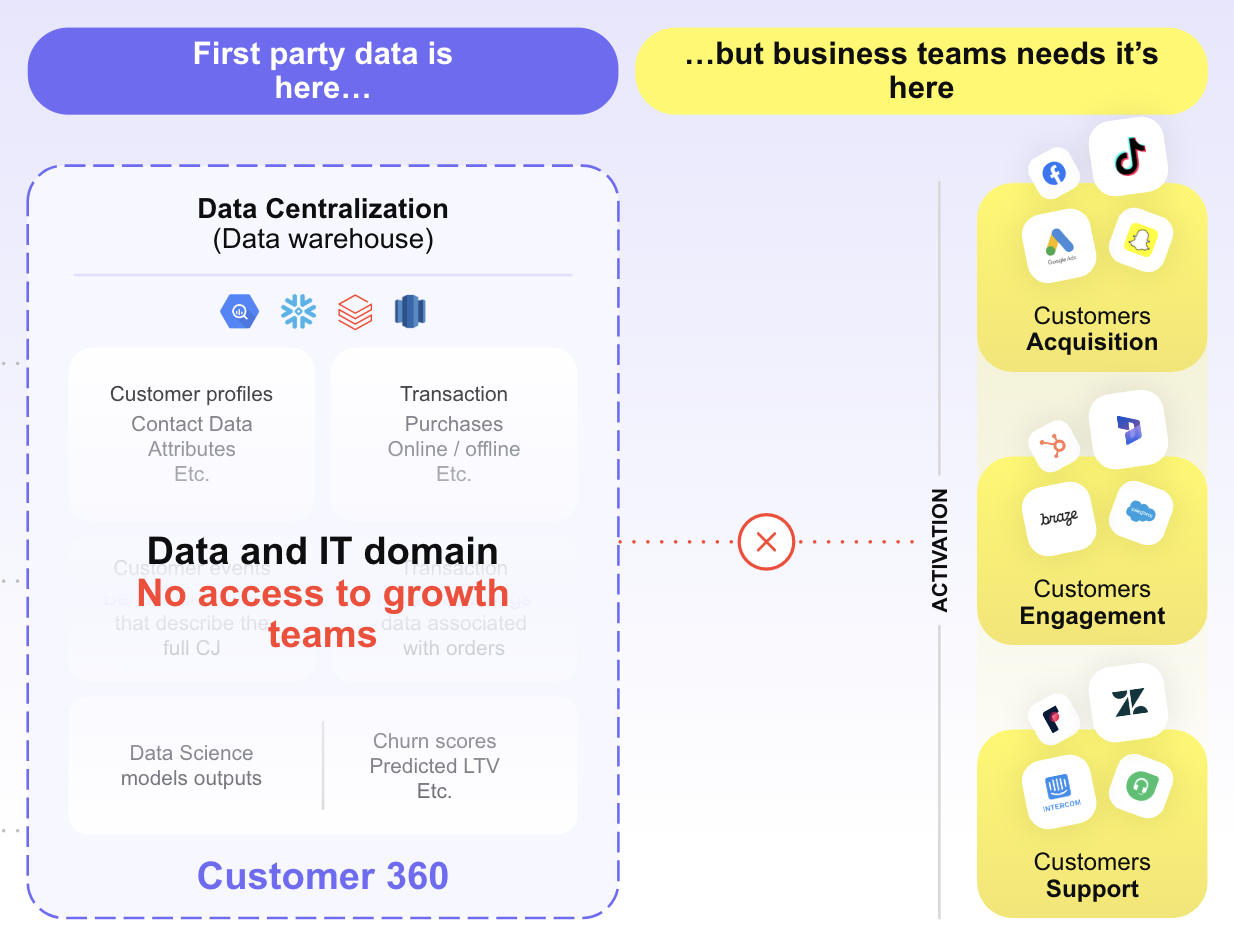
At DinMo, we are convinced that data should not just be used by data teams, but should be shared throughout the company.
Yet, one of the significant challenges businesses face is the technical barrier to leveraging the vast amounts of data they collect. Fortunately, AI can help overcome these barriers by automating complex data analysis tasks and providing intuitive tools that can be used by marketers without a deep technical background.
For instance, AI-powered platforms can automatically clean, organise, and analyse data, presenting insights in an easily understandable format. This democratisation of data allows marketers to make data-driven decisions quickly and efficiently, without needing to rely on specialised data analysts.
At DinMo, we offer an AI co-pilot, DAN, so that anyone can ask him questions about their company, marketing results or recommended actions.
5️⃣ Predict customer behaviour and decrease CAC
When it comes to optimise acquisition and retention, marketers are debating over two fundamental questions:
Who are the people with the most potential I should focus my marketing budget on?
How should I engage each one of them?
And yes, you guessed it: machine learning can now answer these two questions with an accuracy exceeding by far any human analysis.
Machine learning excels at analysing vast amounts of data to uncover patterns and trends that would be nearly impossible for humans to discern.
For instance, by examining past purchase history and browsing behaviour, advanced machine learning models can forecast which products a customer is likely to be interested in next, identify which customers are at risk of churning, and estimate the potential lifetime value of each customer. These insights allow businesses to anticipate customer needs and preferences more effectively.
This predictive capability enables businesses to refine their marketing strategies, ensuring they target the right customers with the most relevant products, offers, and discounts at precisely the right time. This approach, known as the “next best offer” (NBO), enhances the efficiency of marketing efforts and improves conversion rates.
Additionally, by predicting which customers are most likely to churn, businesses can proactively tailor their re-engagement strategies. For example, targeted retention campaigns or personalised incentives can be designed to address the specific reasons for potential churn (Next Best Action strategy).
Moreover, understanding a customer’s predicted lifetime value allows businesses to set optimal acquisition costs, ensuring that the investment in acquiring new customers aligns with their long-term value.
👇 Check what we've done with Galeries Lafayette to see how customer segmentation and Artificial Intelligence help them improve their performances.
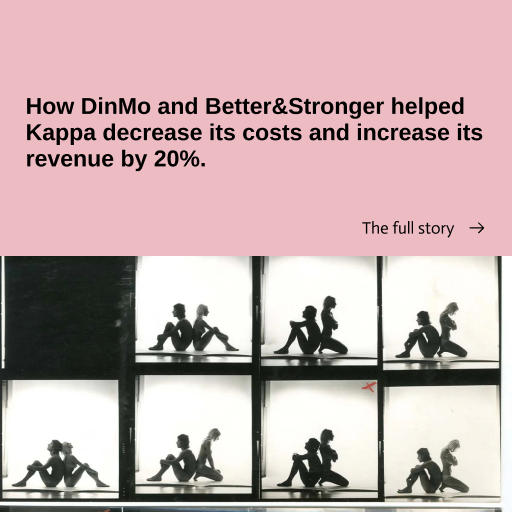
Kappa case study
How to implement AI technologies in your business
As we discussed, implementing AI technologies into your business can drive significant benefits in customer engagement, operational efficiency, and marketing effectiveness. However, developing these tools in-house can be extremely complex, time-consuming, and costly. For most businesses, opting for specialised external solutions is a more practical and effective approach.
Why opt for external solutions?
The development and deployment of AI technologies involve several challenges, including:
Technical complexity: Building sophisticated AI models and integrating them into existing systems requires deep expertise in machine learning, data science, and software engineering. This complexity often exceeds the capabilities of most internal teams.
Resource intensive: Developing AI solutions from scratch demands substantial resources, including skilled employees, computational power, and time. Not only the development, but the maintenance as will require an entire technical team by itself.
Rapid evolution: The field of AI is rapidly advancing, with significant improvements in algorithms and technologies occurring every year. Keeping pace with these developments requires constant updates and expertise that can be difficult to maintain internally.
Leveraging specialised solutions: Customer Data Platforms (CDPs)
Fortunately, to overcome these challenges, specialised external solutions exist: Customer Data Platforms (CDPs). CDPs are designed to integrate, analyse, and leverage customer data efficiently, offering a range of AI-powered capabilities without the need for in-house development.
Traditional CDPs have often been boycotted by businesses due to lengthy implementation times and a sometimes lengthy ROI.
Fortunately, developments in the data ecosystem have led to the emergence of what is commonly referred to as a Modern Data Stack, offering cutting-edge technologies for diverse objectives.
The Modern Data Stack represents a major evolution in the way companies manage and utilise their data. The trend is towards highly customisable data architectures, where each company can build its own "à la carte" solution based on its specific needs, while maintaining flexibility and adaptability.
In that context, more and more companies are building their own Customer Data Platform, embracing a ‘Composable’ approach.
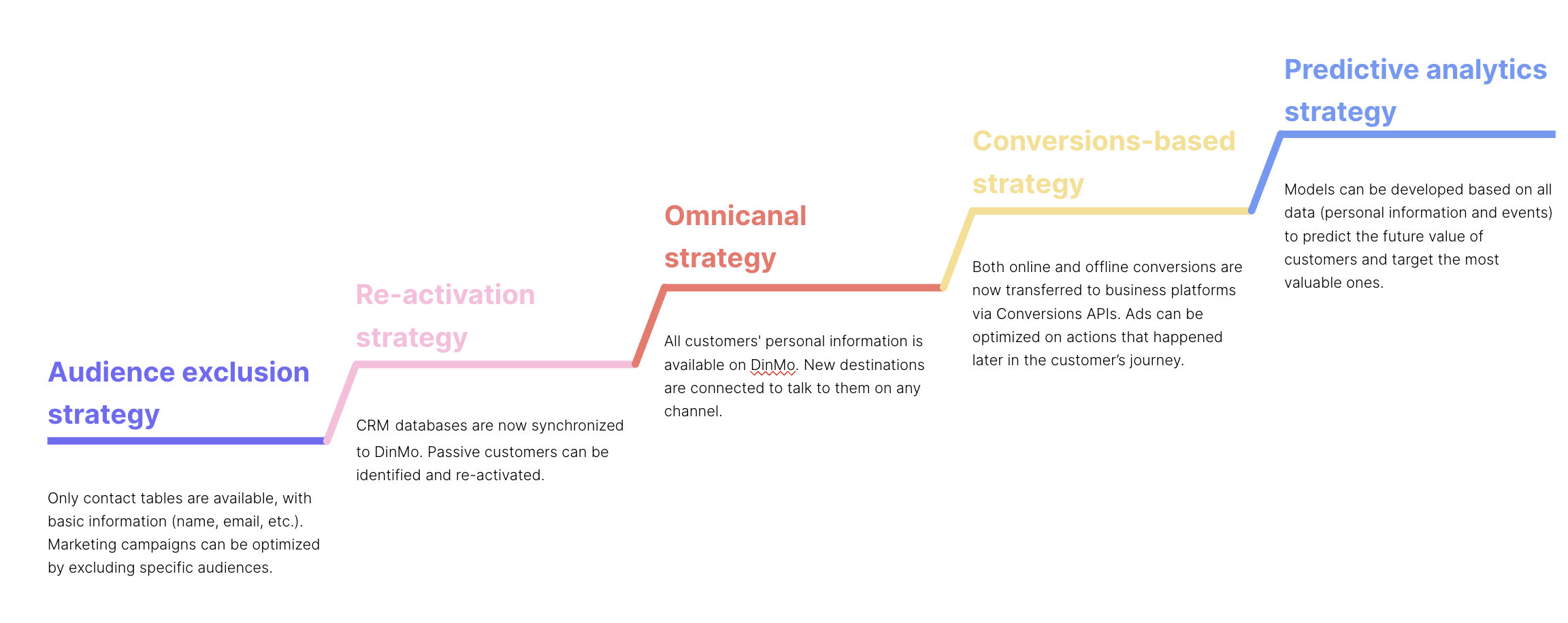
Composable CDP: A Modular Approach
DinMo is a pioneering Composable CDP that leverages a reverse ETL engine on top of a data warehouse and AI to predict future customer behaviour. As a versatile data activation platform, DinMo transforms any cloud environment into a dynamic and actionable hub for every team within an organisation.
Powered by our advanced AI and a suite of no-code features, data and marketing teams can effortlessly access and activate data from their data warehouse directly into 100+ business tools and applications. This seamless integration allows teams to access comprehensive customer data within the SaaS tools you already use, enabling you to deliver the personalised experiences that modern consumers demand.
Conclusion
In conclusion, the integration of AI into marketing practices offers numerous benefits, from predicting customer behaviours and personalising customer relationships to removing technical barriers to data leverage. As AI technology continues to evolve, its impact on marketing will only grow, providing marketers with powerful tools to engage with customers in innovative and meaningful ways. The future of marketing lies in the seamless integration of AI, enabling businesses to stay ahead in an ever-changing digital landscape.
DinMo is trusted by leading companies like Huel, Interflora, Kappa and Tui to sync billions of customer data points and audiences each year, providing the insights needed to stay ahead in a competitive market. Discover how DinMo can transform your data strategy by contacting us! 🌟



















